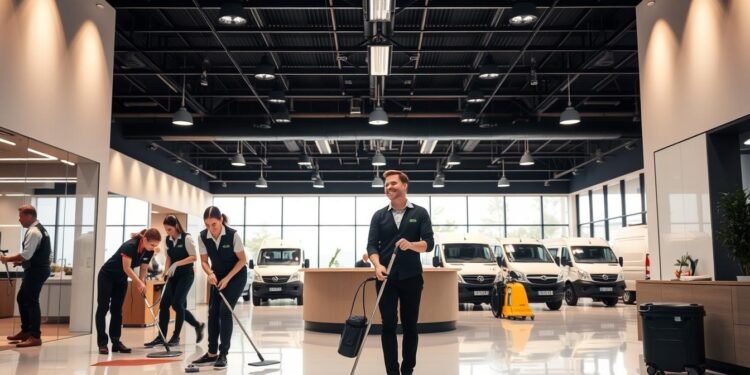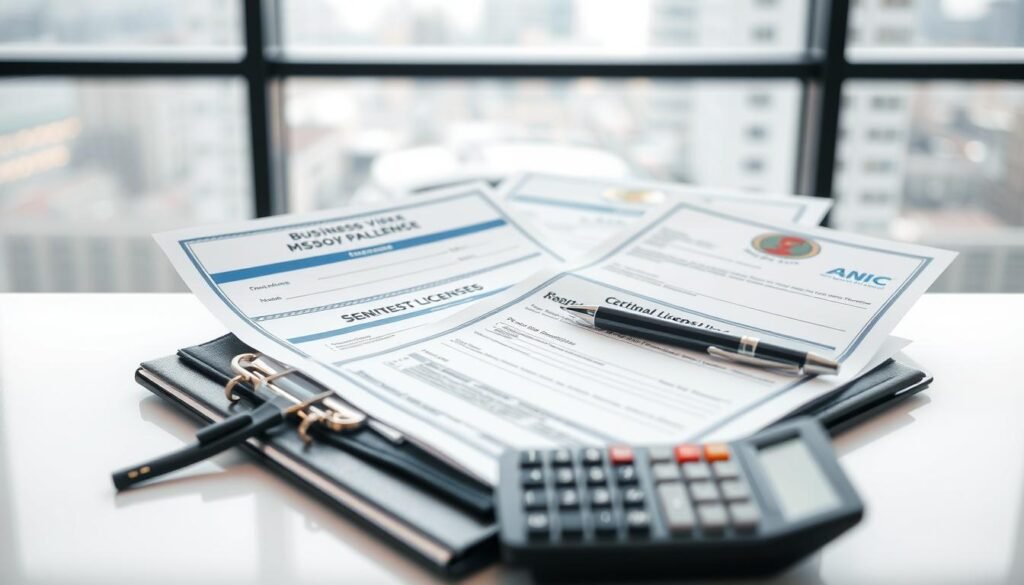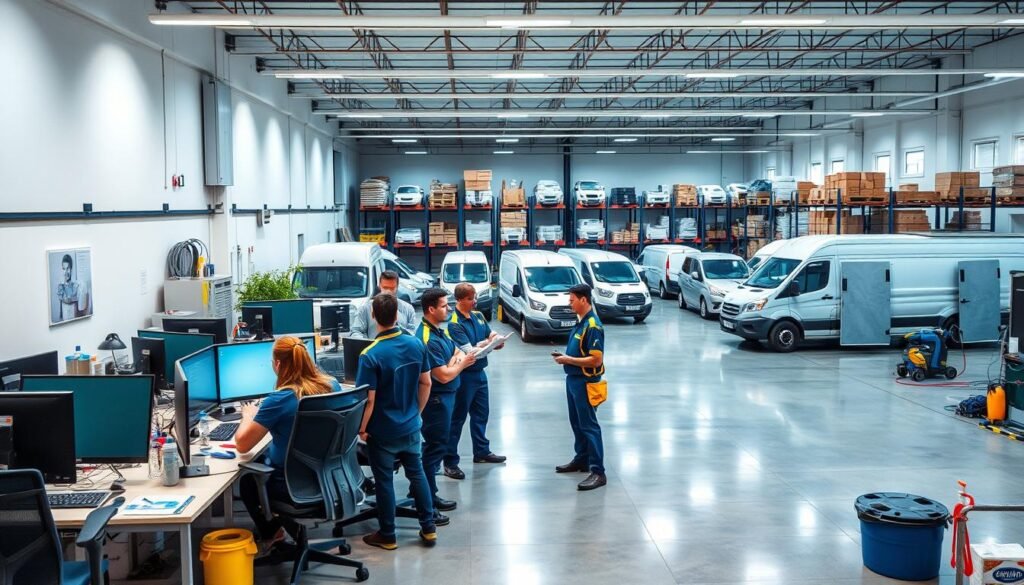Ever wondered why the cleaning industry continues to thrive even in uncertain economic times? With a staggering $46 billion annual market in the U.S., this sector offers lucrative opportunities for entrepreneurs. Low overhead costs and steady demand make it a resilient choice for new ventures.
Launching a cleaning business requires minimal upfront investment—between $3,500 and $12,000—depending on your target market. Residential services often start at the lower end, while commercial operations may need more capital. The best part? 78% of these businesses survive their first five years, thanks to flexible operations and recurring clients.
Dual-income households are driving growth, with a 23% increase in demand for home services. Whether you focus on residential or commercial clients, the potential for steady income is undeniable. Ready to explore a step-by-step approach? Let’s dive in.
Key Takeaways
- The U.S. cleaning industry generates $46 billion annually.
- Startup costs range from $3,500 to $12,000.
- 78% of cleaning businesses survive past five years.
- Dual-income households boost demand by 23%.
- Low overhead makes this a low-risk venture.
Why Start a Cleaning Business?
The cleaning industry offers one of the most accessible paths to entrepreneurship today. With low overhead and consistent demand, it’s a venture that adapts to any budget or schedule. Whether you’re seeking side income or a full-scale operation, the opportunities are vast.
Low Overhead and High Demand
Over 62% of cleaners launch with less than $1,000. Basic equipment like a quality vacuum costs $200–$300, while labor averages $20/hour. Commercial contracts often yield $500–$5,000 monthly, outpacing residential services in scalability.
The industry’s 6% annual growth through 2030 reflects rising needs. Dual-income households and busy professionals drive demand, especially for specialized services like eco-friendly cleaning, which commands 27% higher rates.
Flexibility and Growth Potential
Modern cleaning businesses thrive on adaptability. Nearly 41% of cleaners operate as independent contractors, leveraging gig platforms for clients. Franchises like MaidPro prove scalability, with average revenues hitting $500,000 annually.
Niche markets—from post-construction cleanups to Airbnb turnovers—offer untapped growth potential. With minimal upfront costs and recurring clients, this sector rewards strategic planning and specialization.
How to Start a Cleaning Company Business in 7 Steps
73% of top-performing cleaning services attribute success to strategic planning. This actionable blueprint covers everything from initial market research to client retention systems. Follow these steps to build a profitable operation with minimal risk.
Step 1: Conduct Industry Research
Analyze competitors through platforms like Yelp and Angi. Survey potential clients about pricing tolerance—most residential cleaners charge $25-$50/hour. Attend ISSA trade shows to spot emerging trends like UV sanitization equipment.
Step 2: Secure Funding
SBA loans offer 6-8% rates for qualified applicants. Crowdfunding platforms like Kickstarter work well for eco-friendly startups. Allocate 30% of funding to marketing—the average client acquisition costs $85 initially.
Step 3: Choose Your Market
Urban areas with 50,000+ households support 3-5 cleaning services. Use Census data to find neighborhoods where 40%+ households earn $75k annually. Commercial clients provide steadier contracts but require bonding.
Step 4: Find a Specialty
Specialized cleaning services earn 22% more than generalists. Consider:
- Medical office disinfection (6-month certification)
- Airbnb turnover services ($75-$150 per clean)
- Post-construction cleanup ($0.15-$0.30 per sq ft)
Step 5: Plan the Business Budget
Include $350-$8,000 for bonding insurance in your business plan. Factor in Square’s 2.6% + $0.10 transaction fees. Labor should consume ≤40% of revenue for profitability.
Step 6: Register the Business
File LLC paperwork (14-21 business days processing). Obtain vendor licenses through county clerks. DBAs cost $10-$100 depending on state requirements.
Step 7: Find and Maintain Clients
Offer 15% discounts for 6-month contracts to improve retention. Use CRM software to track customers—retaining them costs $25 versus $85 for new acquisitions. Upsell specialized add-ons like carpet shampooing.
Choosing Between Residential and Commercial Cleaning
Residential and commercial cleaning cater to distinct client needs and revenue streams. While residential services offer flexible hours, commercial contracts provide steadier income. Your choice impacts equipment, insurance, and daily workflows.
Pros and Cons of Residential Cleaning
Residential cleaning averages $25–$50/hour, ideal for solo entrepreneurs. Clients often book recurring appointments, simplifying scheduling. However, cancellations are more frequent, and marketing relies heavily on platforms like Nextdoor.
Equipment costs are lower—home vacuums and eco-friendly supplies suffice. Insurance needs are minimal ($300k liability). Yet, peak demand (weekends) may conflict with personal time.
Pros and Cons of Commercial Cleaning
Commercial cleaning commands $35–$75/hour but requires night or weekend work (68% of contracts). Clients like offices sign long-term agreements, boasting an 83% retention rate. Acquisition involves B2B outreach or RFPs.
Industrial floor scrubbers ($8k+) and specialized disinfectants raise startup costs. $1M liability insurance and performance bonds are often mandatory. The bidding process includes SLAs, but rewards scalability.
Essential Cleaning Business Licenses and Permits
Licensing ensures credibility while avoiding costly penalties. Every state mandates specific permits for handling chemicals, waste, and bonded services. Proper documentation protects both your team and clients legally.
Vendor’s License vs. DBA License
A vendor’s license (seller’s permit) is required in 45 states for taxable services. It allows collecting sales tax, costing $0-$100 with annual renewals. DBAs (“Doing Business As”) register your trade name separately from legal entities.
DBA licenses range from $15 in Alabama to $150 in Illinois. They’re essential for opening business bank accounts under your brand name. Some counties require both if operating under a fictitious name.
State and Local Requirements
Twenty-nine states mandate janitorial bonds ($5k-$25k) for commercial contracts. Florida requires a mold remediation license ($500 fee), while California’s seller’s permit involves:
- Submitting a BOE-400 form online
- Providing SSN or EIN
- Listing all service locations
OSHA’s bloodborne pathogens standard (29 CFR 1910.1030) applies to medical facility cleaners. Maintain an MSDS binder for all chemicals per EPA 40 CFR Part 262. Non-compliance fines exceed $13,000 per violation.
Insurance and Bonding for Cleaning Businesses
Financial safeguards separate thriving cleaning ventures from risky operations. The right insurance and bonding solutions prevent catastrophic losses while building client trust. Industry data shows 38% of service businesses face claims within their first three years.
Essential Coverage Types
General liability insurance ($500-$2,000 annually) covers property damage claims during services. Worker’s compensation costs vary by state—Texas averages $2.16 per $100 payroll. Commercial auto policies are crucial for mobile operations.
Compare providers like Hiscox (specialized in small businesses) versus Next Insurance (digital-first platform). Both offer certificates of insurance (COI) instantly—a requirement for 92% of corporate contracts. Watch for employee theft exclusions in basic policies.
The Bonding Advantage
Surety bonds guarantee service completion, with claims averaging $7,500 payout. The process takes 14-45 days from claim to resolution. Commercial clients often require $5,000-$25,000 bonds, especially for government contracts.
A Chicago cleaning service avoided $12,000 in damages when their bond covered accidental office floor scratches. This protection secured their contract renewal with a 22% rate increase.
Policy Red Flags
Avoid these common pitfalls when selecting coverage:
- Missing equipment replacement clauses
- Sub-limits on chemical damage claims
- Slow claim processing timelines (over 30 days)
- Exclusions for mold remediation
- No coverage for subcontractor errors
Annual policy reviews prevent coverage gaps as your business grows. Partner with agents experienced in janitorial services for tailored commercial insurance solutions.
Setting Up Your Cleaning Business Operations
Efficient operations form the backbone of any successful service-based venture. A well-planned system for managing equipment, supplies, and personnel ensures consistent service quality while controlling costs. Invest time upfront to establish protocols that scale with your growth.
Equipment and Supplies Checklist
Startup packages ranging from $1,200 to $5,000 cover essentials like Kärcher scrubbers for commercial jobs. Prioritize commercial-grade vacuums with HEPA filters ($300-$600) over residential models. Chemical-resistant gloves and OSHA-approved respirators protect your team during training and daily use.
Create a chemical safety protocol using EPA Safer Choice-certified products. Microfiber cloths (12×16 inches) and color-coded mop systems prevent cross-contamination. Inventory management apps like Sortly track supplies usage across multiple job sites.
For fleet vehicles, GPS trackers and bulk equipment mounts optimize routes. Commercial accounts may require industrial floor machines—lease options start at $150/month. Always maintain 30% extra supplies for emergency call-outs.
Hiring and Training Cleaners
The average cleaning service spends $85 per employee on hiring processes. Use skills assessments for time management and attention to detail during interviews. ADP’s payroll system ($50/month + $5/employee) simplifies tax compliance for growing teams.
Develop an 8-hour safety training module covering OSHA 10-hour certification topics ($75/employee). Include 4 hours on customer service protocols like discreet client interactions. Document all procedures in a searchable digital handbook for reference.
Onboarding checklists should verify I-9 and W-4 forms, uniform fittings, and equipment proficiency tests. Pair new hires with mentors during their first 10 jobs. Performance bonuses tied to client satisfaction scores improve retention by 41%.
Regular training updates keep teams current on disinfectant dwell times and green cleaning techniques. Cross-training staff for both residential and commercial operations maximizes scheduling flexibility during peak periods.
Marketing Your Cleaning Business
Effective marketing transforms local services into trusted household names. With 94% of clients checking reviews before hiring, a multi-channel approach ensures visibility. Balance digital tools with community-building tactics for maximum impact.
Dominating Digital Channels
Optimize your Google Business Profile with:
- High-resolution before/after photos
- Keyword-rich service descriptions
- Weekly post updates about seasonal offers
Facebook Ads targeting homeowners aged 30-55 yield 23% higher conversion rates. Use lookalike audiences based on existing clients for better ROI. Instagram Reels demonstrating cleaning techniques boost engagement by 40%.
Local Outreach That Converts
Chamber of Commerce events provide access to commercial decision-makers. Prepare a 30-second pitch highlighting:
- Specialized disinfecting protocols
- Flexible scheduling for offices
- Bonded and insured status
Referral programs with $50 credits per successful lead increase repeat bookings. Vehicle wraps featuring your brand colors and contact info generate 15-20 daily impressions per car.
Direct mail outperforms email with 3.7% response rates—target neighborhoods with median incomes above $75k. Track all campaigns using UTM codes to identify top-performing marketing channels.
Conclusion
The $46 billion cleaning industry shows no signs of slowing down, with a steady 6% growth projected annually. This resilient sector rewards those who focus on niche markets, maintain proper insurance, and prioritize client retention.
With low startup costs and flexible operations, entering this field remains accessible. Specializing in areas like eco-friendly services or commercial contracts can boost earnings. Emerging trends like robotic cleaners and green certifications offer new growth opportunities.
Download our free business plan template to kickstart your venture. The right strategy transforms effort into lasting success. Now is the perfect time to tap into this thriving market.
FAQ
What are the startup costs for a cleaning venture?
Initial expenses range from ,000 to ,000, covering supplies, equipment, insurance, and marketing. Commercial operations often require higher investments than residential services.
Which certifications boost credibility in this industry?
ISSA’s CIMS certification and OSHA safety training enhance professionalism. Specialty certifications like carpet cleaning or hazardous waste handling open premium service opportunities.
How do I price services competitively?
A> Base rates on square footage, frequency, and service complexity. Commercial contracts typically use per-square-foot pricing, while residential jobs often charge hourly or flat fees.
What software helps manage operations efficiently?
A> Platforms like Jobber and Housecall Pro streamline scheduling, invoicing, and client communication. QuickBooks simplifies accounting for small teams.
How can I differentiate from established competitors?
A> Focus on niche markets like eco-friendly cleaning or post-construction cleanup. Superior customer service and flexible scheduling also create competitive advantages.
What’s the best way to find reliable employees?
A> Use Indeed or local job boards, emphasizing trustworthiness in listings. Offer above-market wages and performance bonuses to reduce turnover in this high-attrition field.
Should I lease or buy cleaning equipment initially?
A> Leasing commercial-grade machines reduces upfront costs, while purchasing basic supplies (mops, vacuums) makes long-term financial sense for steady workloads.
How do I handle difficult client situations?
A> Implement clear service agreements outlining expectations. Address complaints immediately with refunds or re-cleaning, preserving your reputation through transparency.








